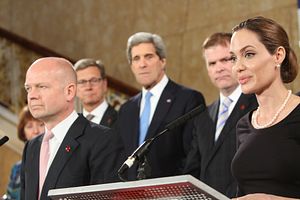There has been no shortage of movies made about Cambodia and the Khmer Rouge. Some, like David Putnam’s The Killing Fields, hit their mark in the 1980s and became a cultural reference point for one of the great tragedies of the 20th century.
James Gerrand, who produced the documentary Cambodia: The Prince and the Prophecy, is in a similar league to Putnam in defining the brutal regime and its impact on the country.
Those events were a long time ago, and Cambodia has moved on. But decades after the Khmer Rouge were driven out of Phnom Penh and since the final shots were fired in that long-running civil war, public interest in the subject seems stronger than ever.
This has been helped by UN-backed efforts to put surviving leaders of the Khmer Rouge on trial, maturing post-war baby boomers who are less afraid of asking about this country’s war-time past, and more pragmatic considerations like a substantial drop in the cost of video production.
The result is a renaissance of sorts in the Khmer Rouge genre, if you will, is underway, with no shortage of producers and directors in search of a script about Pol Pot and the deaths of more than two million people.
But not every production has been a winner. Far from it.
New York filmmaker Robert Lieberman produced Angkor Awakens: A Portrait of Cambodia. Sadly, this documentary is a dreadful rerun of almost every cliché written about Cambodia by navel-gazing Americans, and many of them are wrong.
John Pirozzi did better with Don’t Think I’ve Forgotten: Cambodia’s Lost Rock and Roll, although his public relations machine could do with some cheering up after being criticized for a ham-fisted approach with respect to screenings in Cambodia, particularly the countryside.
Not so with German film maker Marc Eberle. Last year he released Cambodia Space Project: Not Easy Rock ‘n Roll — a blend of 1960s Cambodian pop and latter day Western rock and shot through the eyes of Khmer diva, Srey Thy – also known as Kak Channthy – who sings 1960s Khmer evergreens along with her own mixes.
It premiered in Phnom Penh with Hollywood star Angelina Jolie, her then husband the actor Brad Pitt, and James Gerrand in the audience at the Cambodian International Film Festival.
Eberle’s latest effort, a short documentary about an uprising by Muslim Chams against the Khmer Rouge in late 1975, The Cham Rebellion of Svay Khleang, was terrific.
It delves into the lives of two students attempting to piece together how more than 1,000 families were slaughtered by Pol Pot’s ultra-Maoists after being stripped of their Islamic identity.
A River Changes Course from the Khmer-American camera-woman Kaylanee Mam has been received international acclaim.
Then there was Ian White’s debut as a feature director in Before the Fall about life and love as the Khmer Rouge seized control. And a full-length feature, One Crowded Hour, based on the life of legendary war correspondent Neil Davis is in the advanced stages of pre-production.
Amid this motley group, Jolie has launched her latest effort, First They Killed My Father, a first-hand account of genocide through a child’s eye. So far, the Hollywood actress turned director is winning fans for this Khmer language film, particularly among Cambodia’s youth.
An overwhelming majority of people here who are under 30 like Western culture and are enamored by Jolie and her cult-like status as a pop culture icon.
First They Killed My Father won’t be released on Netflix until September. As such, reviews will be important. So far, Jolie is travelling well, as should be expected in a country where her humanitarian work has not gone unnoticed.
At the world premiere in Siem Reap last Saturday and at a special show opened to thousands at Olympic Stadium in Phnom Penh the following Tuesday, the audience was overwhelmed with delight, with some bursting into tears.
“It’s good and critical,” Sam Chanmaliny, a popular TV news anchor, told The Diplomat, echoing a sentiment heard among several other prominent Cambodians familiar with the film scene.
“It reflects Cambodian history and how the war started. How people were forced out of the city to the countryside, and how they lived in pain and fear,” she said.
“People feel powerless in letting the world know how our country suffered in war, but thanks to Angelina Jolie, she does makes our voice louder and more powerful.”
Based on the reception it has received so far in Cambodia, First They Killed My Father should be judged an initial success. But more significantly, seen from a broader historical perspective, it is also a important addition to a genre of movies that are still defining what happened here under the Khmer Rouge all those years ago.
Luke Hunt can be followed on Twitter @lukeanthonyhunt

































